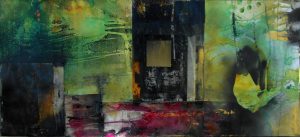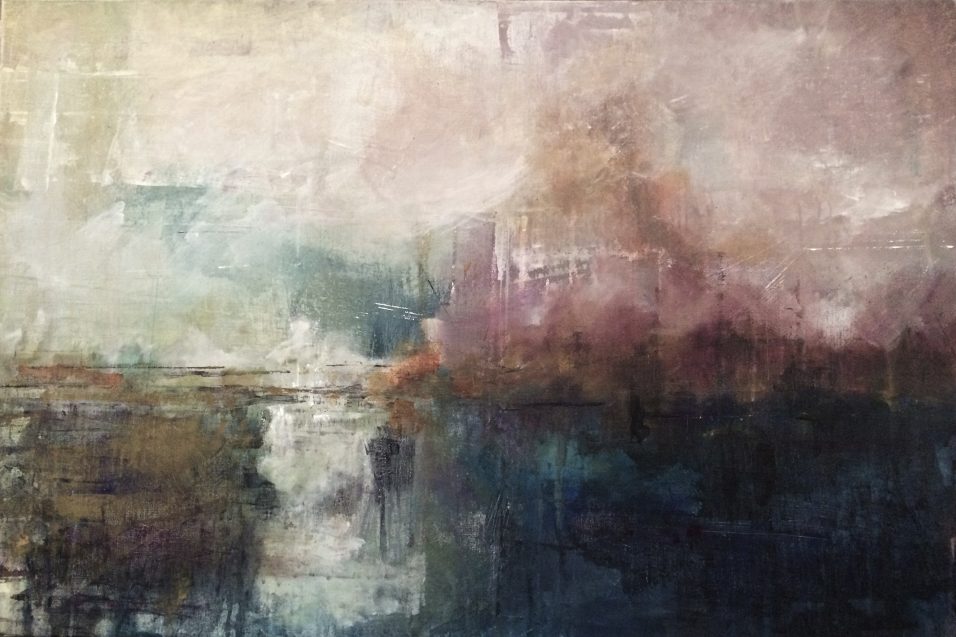By Genevieve Allen Hearn
The Grapevine asked Lynda Macdonald at the Harvest Gallery to start a chain of questions from artist-to-artist.
Lynda Macdonald: What superpower would you have and why?
Ian Gilson: My superpower of choice would be the ability to breath underwater. That way, when everything was too noisy, too rushed and hectic, I could find a cove, a lake, or a swimming pool and sink. Hanging out on the bottom of a pond in the woods or sitting watching lobsters going about their business would be the perfect way to unwind.
Ian Gilson: If you could ask one artist who’s no longer with us for advice who would it be and what would you ask?
Mark Hamilton: Well, there are many artists I’d love to talk to, characters like Aubrey Beardsley, Degas, Pollock… would they lock me up if I should just start talking to them? Unfortunately the piece of advice I want isn’t something I could ask those guys, because my concern is a more contemporary problem, I think. It’s this: I find myself enthusiastically working in very different styles and exploring the possibilities of each. There are so many wonderful ways of painting that still have fertile ground left to turn and work, so should I follow my nose every time I step to the easel or spend deeper time working in one set of visual concerns? My instinct is to trust whatever comes through me as part of a more-or-less spontaneous process and follow it where it leads without imposing too much. So with apologies, I’m going to cheat a bit and pretend to ask the question to a living artist instead, noted for mastering many styles, like Gerhart Richter.

Mark Hamilton: In your work I sense depictions of both interior and external environments. Is one of those more important to you in your process?
Corinne Redden: These elements in my work hold equal importance because they do not exist independently. Both environments are present in most of my paintings, encompassing the interactions of the individual with the self and the world on a macro and micro level.

Corinne Redden: What does your painting mean to you?
Keith Gale: As a meaning-making creature, I project all kinds of strange yet gratifying meaning onto the act of painting. Painting means I get to laugh and cry and feel more alive. Painting is a way to be wrenched from the tyranny of space and time and to ponder the nature of eternity. Painting is a way of plumbing the depths of the mystery of God, it’s a way to breach the void that keeps me artificially separated from the rest of creation, it’s a path to opening my heart to the creative force at the source of all things in the universe and wrestle with what it all means. So painting, I suppose, means I get to practice being a better meaning-making creature. I like that, and since I can’t imagine not doing it, I keep painting.

Keith Gale: What thoughts and emotions do you experience when you paint, and how do they help (or hinder) the creative process?
Melanie Morrissey-Pictou: I have always found expressing my emotions and thought process to be difficult or to be more precise – embarrassing. Conveying my emotions requires an intimacy that I have never been comfortable sharing with others. When I paint, it is my internal voice sorting through many memories and events that may linger or have yet to occur. It is my conflict resolution through a change in perspective. It is my 12-step grief management ritual. I find that as I let my mind wander it will often develop an awareness of many emotional elements that I repeatedly work out in my art. I often struggle with memories of loss, anger, and regret but in the process of painting, I allow my mind to alter past events as they play out on my canvas. Some of those memories are dark and painful while others are full of joy. My mind sorts through a Cornucopia of feelings for life moments and struggles to recreate new ways of seeing them in art. Whether I feel melancholy, trepidation, euphoria or anticipation: all emotions are difficult to express and are equally humiliating. However, they are the fuel to my creative process, and the reason I create.

